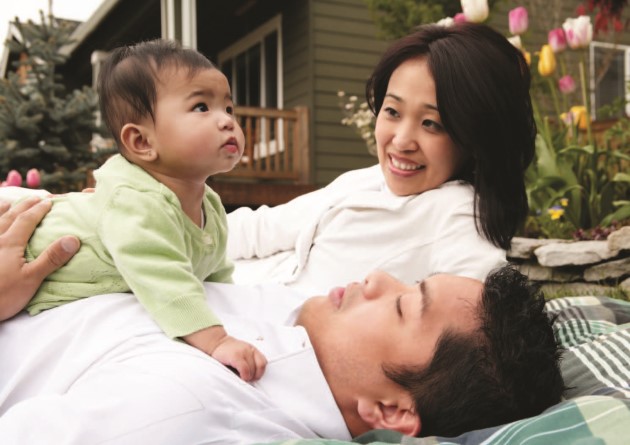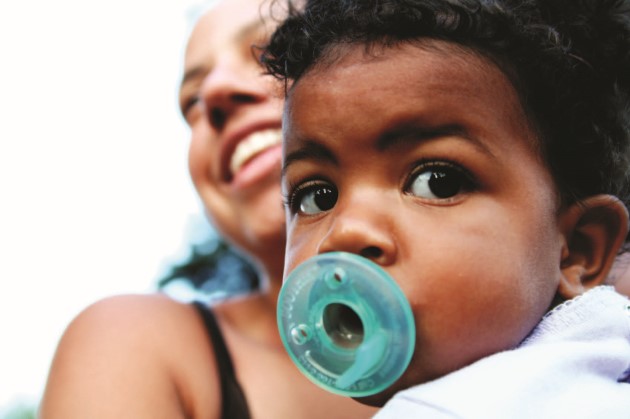
Babies begin learning during the very first minutes of their lives. By age 3, about 85 percent of the brain is wired. This wiring affects how your baby sees, talks, hears, moves, and interacts with others.
Babies need a warm and loving environment to develop the brain connections that will help them learn throughout their lives. Physical, cognitive, language, social, and emotional development are all linked together. Everything in the brain and the body is connected. Babies are learning to talk, to work their bodies, and to form strong bonds with caring adults. Everything works together to build their brains.
The way people treat your baby affects how her brain develops. When babies live in a safe loving home, they reach out, explore, and learn. When you spend time enjoying and playing together, your baby learns how to love and relate to others. Parents are the best and first teachers that babies have.
A baby’s first teeth often come in at about 6 months of age, but some babies get them as early as 3 months of age. Some babies won’t get any teeth until after a year. The age doesn’t matter. Once she starts, your baby will teethe off and on for months.
Here are some signs to look for:
- Your baby will want to chew on everything.
- She will probably drool more than usual and may be fussy and cranky.
- As teeth push through the gums, your baby will feel some soreness. Chill a clean teething ring in the refrigerator, then give it to your baby to chew on. If your baby has a fever, vomiting, diarrhea, or other signs of illness while teething, call your doctor.
The American Dental Association suggests that parents:
- Begin brushing their baby’s teeth with a little water as soon as the first tooth appears.
- Not use toothpaste until their baby is at least 2 years old.
- Get a well-baby dental checkup by their baby’s first birthday.
It’s easy to ignore the first signs of stress. But if you tune into your body and your feelings, you can learn to read the warning signals and take action to reduce tension.
Put your baby down for a nap and forget about the things you think you should be doing. Use this time to rest and relax.
Set realistic goals and prioritize. Trying to do everything, plus taking care of your baby, will wear you out. Pick the most important things and don’t worry about the rest.
Eat healthy foods, including veggies, fruits, and whole grains.
Your sleep is as important as your baby’s sleep. You need enough sleep to stay healthy.
Plan time for yourself. Ask a friend to watch your baby while you exercise or do whatever makes you feel fresh again — energized and relaxed.
When you feel worried or angry, don’t bottle it up. Talk to a trusted friend. If your feelings seem to be getting out of control, or if tension is so high that your partner reacts by harming you, there is help available. Call 800-799-SAFE (7233), the National Domestic Abuse Hotline.
The Consumer Product Safety Commission recommends that babies NOT use a walker. They can be very dangerous. Many infants arrive in emergency rooms after baby walker accidents. These injuries are usually serious, including skull fractures and other head injuries.
Many of the injuries are caused by infants falling down stairs in a walker. The stairs either do not have gates on them or the gates are left open.
Not only are they unsafe, baby walkers generally do not help babies learn to walk. Some experts think that baby walkers do more harm than good for leg muscle development in most babies.
Strollers, on the other hand, can be useful.
When buying or borrowing a stroller, look for one that has:
- A firm backrest to help the baby sit up
- A canopy or covering for the head tall enough that a 3-year-old can sit under it
- A seat belt that is secure and comfortable
- Wheels that can be locked
- A special latch to prevent the stroller from accidentally folding
- A wide base to prevent tipping
When you use the stroller:
- Never leave the stroller in the driveway or behind a car.
- Keep your baby with you at all times.
New Abilities Create Safety Hazards
Your baby can wiggle out of an infant seat, out of the bathtub, off the changing table, and off the bed.
Next time your baby is playing with something, watch to see if she looks for it when it is taken away. Probably not. At this age, if she can’t see it, she doesn’t remember that it exists. For your baby, out of sight is out of mind.
When your baby has a toy you want to take away from her, give her another toy before taking away the first one. Put it out of her sight. This is an easy way to redirect her attention.
At this checkup, your baby will get a set of immunizations. The second set of polio, HIB, and DTP immunizations will be given. Remind your doctor of any reaction your baby may have had to the first set of immunizations. Take a list of questions you want to ask your doctor or health care provider.
Keep a record of your baby’s immunizations. Use a health journal, a notebook, or form that you are given. You will be asked about your child’s immunizations many times, including when he goes to school. Make it easy on yourself by keeping this information in a handy place.
Immunizations protect your child’s health. Immunizations are available through your doctor, health care provider, or public health office.
Children can strangle in the cords of window blinds or draperies. Keep them out of your baby’s reach.
Your baby can reach and grab. He can grab your coffee cup or stick his hand in your soup. Hot liquids can badly burn him. Keep your baby away from hot liquids and foods.
Never leave your baby alone in the house or a car, or anywhere for that matter. If you do need to leave your baby alone for a few minutes, put him in a crib or playpen.


 Text4baby will send free text messages to your cell phone with health tips for you and your baby. It’s all free! To sign up, text BABY to 511411 or go to
Text4baby will send free text messages to your cell phone with health tips for you and your baby. It’s all free! To sign up, text BABY to 511411 or go to